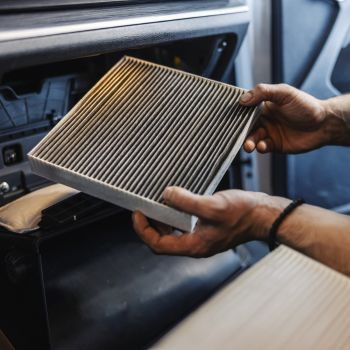 Your car is equipped with two types of air filters. The engine filter, which cleans the air traveling to your engine and removes dirt or dust particles that may clog other vehicle components. Meanwhile, the cabin air filter traps particles that could enter the interior of your car to prevent accumulation and control allergens.
Your car is equipped with two types of air filters. The engine filter, which cleans the air traveling to your engine and removes dirt or dust particles that may clog other vehicle components. Meanwhile, the cabin air filter traps particles that could enter the interior of your car to prevent accumulation and control allergens.
Eventually, the paper or cloth filter becomes saturated with dirt and debris. This can affects its performance, how the engine functions and the air quality inside your vehicle. As a result, these filters will need to be cleaned – if reusable – or changed. Learn when you should have this done.
Role of an Air Filter
The cabin air filter helps ensure all passengers have clean air to breathe. When the filter is not performing efficiently, allergens and other small particles gradually start to accumulate inside the seating area. As a result, passengers may experience breathing difficulties or an allergic reaction.
The engine filter prevents dirt, debris and other particles from passing into the engine, which ultimately helps manage fuel economy and performance. Without it, particles settle in the fluids passing through your engine, impacting how well it operates. A dirty filter also influences how well the engine cools itself. Over time, this development causes the engine to work harder, overheat and consume more fuel, increasing the risk of failure.
To perform these actions, each air filter is made of a paper, synthetic or fabric-like material arranged in a pleated formation and often given reinforcement. When new or cleaned, the material traps particles as small as 5 to 10 microns, while allowing air to flow through.
Routinely changing the air filters:
- Helps control dirt and pollutants passing into the vehicle and engine compartment
- Helps control the emissions your car generates
- Improves indoor air quality, both in terms of scent and allergens
- Reduces the amount of gas your car consumes
How Long an Air Filter Should Last
Since they trap debris, air filters will naturally see a decline in performance. The average driver has the filter changed every 12,000 to 15,000 miles, based on vehicle make and model, or every 12 months – whichever comes first. However, certain factors may require more frequent changes:
- Regularly driving in stop-and-go traffic.
- Living in or regularly driving through dusty or polluted areas.
- Driving over dirt or gravel roads.
- Living in a damp climate. In this case, the filter becomes saturated with moisture and starts to grow mold or mildew.
- Taking your car or truck off-roading.
- Living in a region that’s hot for most of the year.
Signs Your Car Needs a New Air Filter
Your filter might tell you directly: Some include an indicator that changes color when it’s time for a replacement. Without this indicator, your car’s performance can signal a dirty, clogged engine filter if:
- Your vehicle gets fewer miles per gallon
- The engine regularly misfires, idles loudly or stalls
- The check engine light recently came on
- You failed an emissions test
- You notice a hissing or whistling sound when your car is idle
- Your car takes longer to accelerate or does so unevenly
If the cabin air filter is dirty, you may notice a strong odor inside your vehicle – potentially moldy or rotten – or feel less air passing through the dashboard vents.
Have you noticed signs of a dirty engine or cabin air filter? Schedule service with DaSilva’s Auto Body to have your vehicle inspected and the filter replaced.




